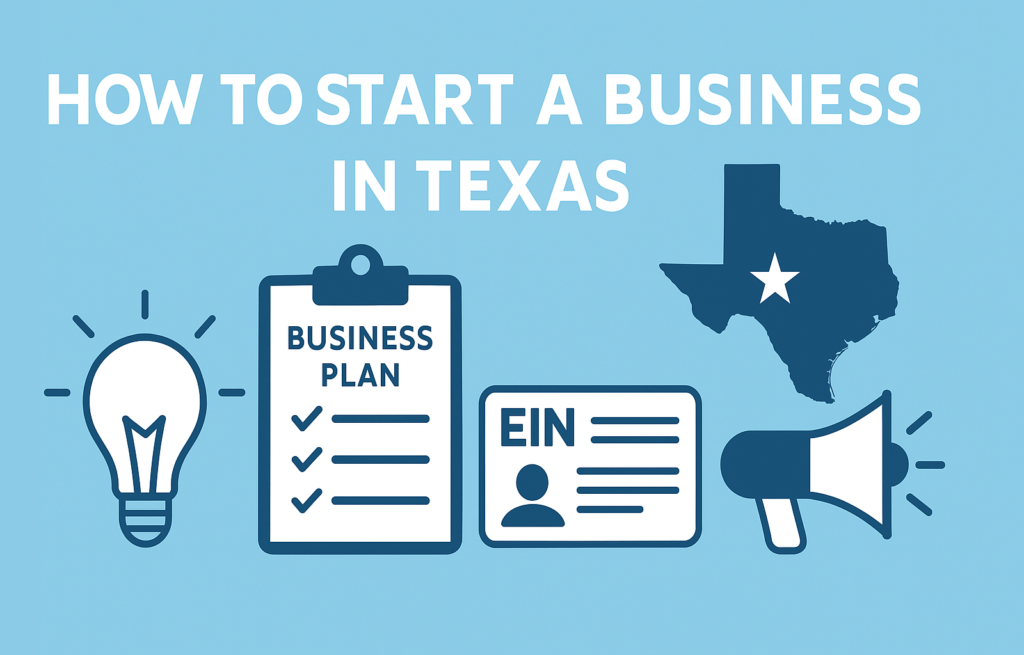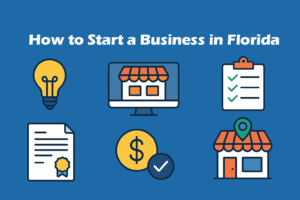Everything’s bigger in Texas — including your business dreams. Whether you’re planning to open a small local shop, launch a startup, or grow a family-run venture, Texas is an attractive place to get started. With no state income tax, a strong economy, and supportive communities, it’s no surprise that thousands of new businesses launch in the Lone Star State every year.
If you’re ready to turn your idea into reality, here’s a step-by-step guide on how to start a business in Texas — covering every step from brainstorming to opening your doors.
Start with a Solid Business Idea
Every successful business begins with a clear idea. Maybe you’ve spotted an unmet need in your community, or you’re ready to turn your passion into a paycheck. Take time to validate your idea — research your potential customers, study your competitors, and make sure there’s enough demand for what you plan to offer.
Write a Business Plan
Once you’ve got your idea, you’ll want to write a business plan to map it out clearly. Think of this plan as your blueprint — it helps you stay focused, spot challenges early, and share your vision with lenders or investors.
A strong business plan usually includes:
- An overview of your product or service
- A description of your target customers
- Competitor analysis and market research
- Pricing, marketing, and sales strategies
- Financial projections and funding needs
A solid plan won’t guarantee overnight success, but it greatly increases your chances of staying on track and securing financing.
Choose the Right Structure for Your Business
Choosing your business structure is one of the biggest decisions you’ll make. It affects your taxes, personal liability, paperwork, and future growth.
In Texas, the most common structures are:
- Sole Proprietorship: Simple and low-cost. You’ll report business income on your personal tax return — but your personal assets are not protected.
- Partnership: Similar to a sole proprietorship but owned by two or more people.
- Limited Liability Company (LLC): Very popular because it separates your personal and business assets and offers flexibility for taxes. Filing a Certificate of Formation costs $300 through the Texas Secretary of State.
- Corporation: Better for businesses planning to issue shares or raise outside capital. A Texas for-profit corporation also costs $300 to file.
If you want to operate under a name other than your own, you’ll file an Assumed Name Certificate (DBA) with your county clerk — typical fees range from $15–$25.
👉 For more details on structures and filing, visit the Texas Secretary of State – Corporations Section.
Typical Texas Business Filing Fees
Here’s a quick look at the most common filing fees for starting a business in Texas:
| Filing Requirement | Form Name | Where to File | Typical Fee (USD) |
| LLC Formation | Certificate of Formation (Form 205) | Texas Secretary of State | $300 |
| Corporation Formation | Certificate of Formation (Form 201) | Texas Secretary of State | $300 |
| Assumed Name Certificate (DBA) | Varies by county | County Clerk’s Office | $15–$25 |
| Registered Agent Service (Optional) | — | Private Registered Agent Provider | $50–$150 per year |
| Employer Identification Number (EIN) | EIN Application | IRS Website | Free |
Always double-check with the Texas Secretary of State or your local county clerk to confirm the latest fees.
Finance Your Business
Most new businesses need some funding to get off the ground. Estimate your startup costs — equipment, inventory, rent, website, marketing, and working capital.
Common ways to finance your Texas business include:
- Personal savings
- Loans from family or friends
- Bank loans or credit unions
- Small Business Administration (SBA) loans
- Local grants or economic development programs
Keep personal and business money separate by opening a dedicated business bank account.
Get an EIN
An Employer Identification Number (EIN) is like a Social Security number for your business. The IRS uses it to identify your business for taxes, and you’ll need it to open a business bank account, hire employees, or file certain permits.
Getting an EIN is free and fast — apply directly through the IRS website.
If you’re a sole proprietor with no employees, you might not be required to get one — but it’s still a good idea to separate your business and personal finances.
Register a Registered Agent
If you’re forming an LLC or corporation in Texas, you must appoint a registered agent. This is the person or company that receives legal documents and official notices on behalf of your business.
You can act as your own registered agent if you have a Texas address and are available during normal business hours. Many business owners hire a professional registered agent service to make sure they don’t miss anything important.
Cost: Registered agent services generally cost $50–$150 per year.
Learn more at the Texas Secretary of State – Registered Agent FAQs.
Register Your Business
Once you have a registered agent, it’s time to officially register your business with the state.
- For an LLC, file a Certificate of Formation (Form 205) — filing fee: $300.
- For a for-profit corporation, file a Certificate of Formation (Form 201) — filing fee: $300.
- For a DBA, file an Assumed Name Certificate at your county clerk’s office — typical fees: $15–$25.
File online using SOSDirect or mail in the forms. Once approved, you’ll receive a stamped Certificate of Formation — keep this for your records.
Obtain Business Licenses and Permits
Depending on your industry and location, you may need local, state, or federal licenses to operate legally. For example, restaurants, child care centers, salons, and contractors often need special permits.
Check with your city or county clerk and the Texas Business Permits Office to make sure you’re fully compliant.
Consider Business Insurance Options
Having the right insurance helps protect your business from unexpected losses or legal claims. In Texas, some landlords or clients may even require you to show proof of coverage before you can sign a lease or contract. If you have employees, check if you’re required to carry workers’ compensation insurance. A quick chat with a local insurance agent can help you find the right policy for your business size and industry.
Market Your Business
Marketing your business is all about getting noticed by the right people. Start with a simple website and active social media profiles where you can share updates and connect with customers. Don’t overlook local networking — word-of-mouth and community referrals are powerful, especially for small businesses. A few good reviews and a clear brand message can make all the difference.
Final Thoughts
Starting a business in Texas is exciting — but it takes planning, paperwork, and commitment. The good news is you’re not alone. From local Small Business Development Centers (SBDCs) to state websites, there’s plenty of help when you need it.
Take it step by step, stay informed, and don’t hesitate to ask for expert advice. With the right foundation, your Texas business can grow bigger than you ever imagined.
Read More: How to Start a Business in California: A Complete Step-by-Step Guide for Startups







